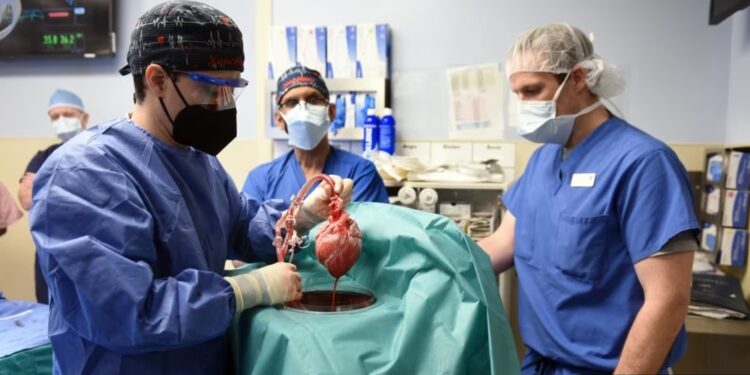By John Ikani
A 58-year-old man made history this week as he became the world’s second recipient of a genetically modified pig heart transplant, marking a significant stride in the realm of medical research.
The procedure, known as xenotransplantation, holds the promise of addressing the persistent shortage of human organ donors, which currently leaves more than 100,000 Americans on organ transplant waitlists.
The University of Maryland School of Medicine was the stage for both heart transplants.
The first patient, who underwent the surgery last year, unfortunately passed away two months post-transplant due to a variety of factors, including pre-existing health issues.
This was made known in a statement released by the university on Friday.
The most recent operation was conducted on Wednesday, involving patient Lawrence Faucette, who was unable to receive a human heart donation due to existing vascular disease and complications related to internal bleeding.
Facing an almost certain heart failure scenario, Faucette expressed his outlook, saying, “My only real hope left is to go with the pig heart, the xenotransplant. At least now I have hope, and I have a chance.”
Following the transplant, Faucette displayed signs of improvement. He was able to breathe without assistance, and the new heart was functioning well, all without the need for external supportive devices, as confirmed by the university.
In addition to conventional anti-rejection drugs, Faucette was also undergoing a new antibody therapy aimed at preventing his body from causing harm to or rejecting the newly transplanted organ.
One of the significant challenges with xenotransplants is the body’s natural immune response against foreign organs. Scientists are actively working on overcoming this challenge by utilizing organs sourced from genetically modified pigs.
In recent years, doctors have made strides in transplanting kidneys from genetically engineered pigs into patients declared brain-dead.
The NYU Langone Hospital Transplant Institute in New York, for instance, recently reported a groundbreaking 61-day function of a pig kidney transplanted into a brain-dead patient.
While earlier xenotransplantation efforts explored the use of organs from primates, such as the famous case of “Baby Fae” receiving a baboon heart in 1984 (although she survived for just 20 days), the current focus has shifted toward pigs.
Pigs are seen as optimal donors for humans due to their organ size, rapid growth, prolific litters, and their existing role as a source of food.




































